Publications
Total 101건
-
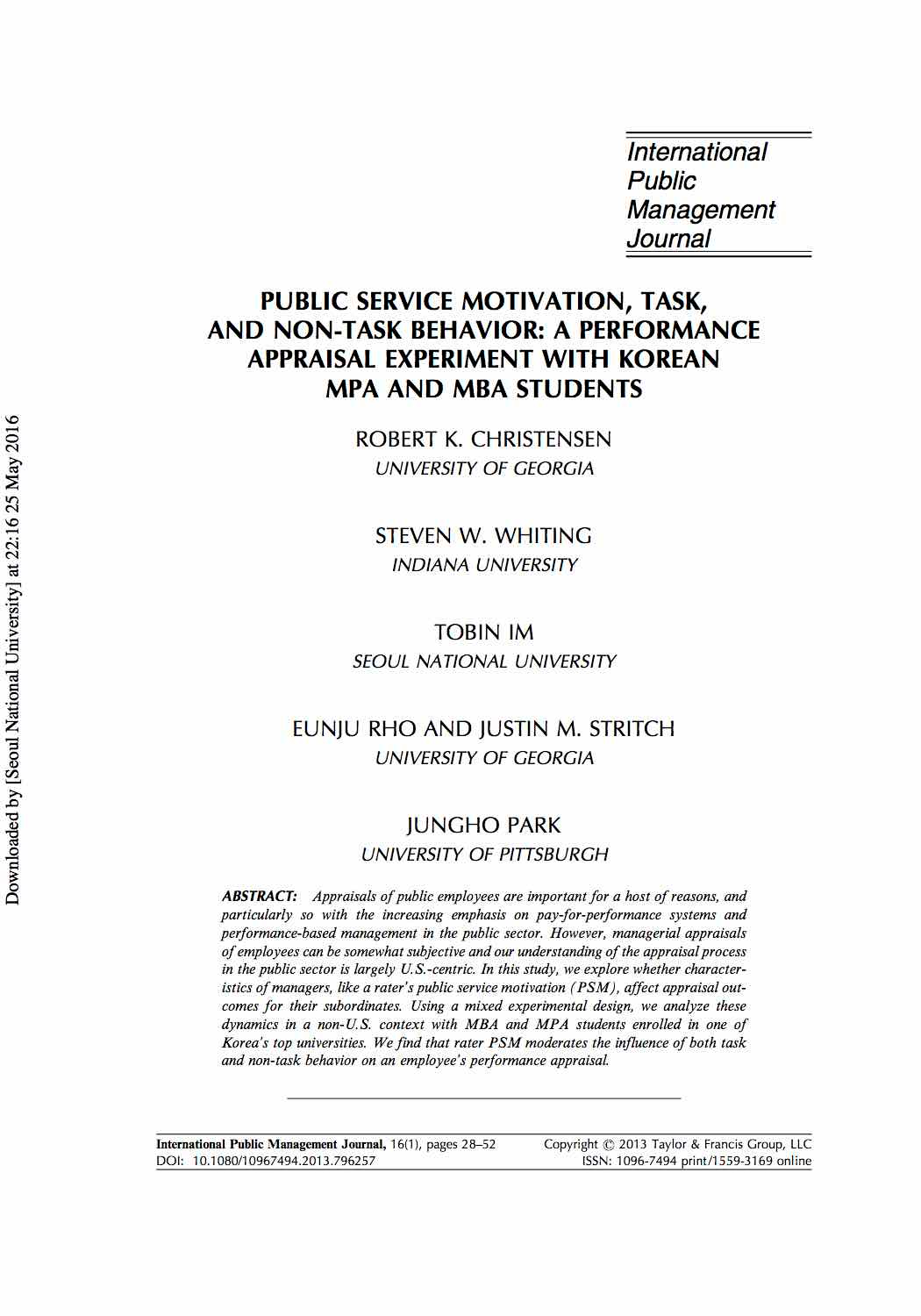 Robert K. Christensen, Steven W. Whiting, Tobin Im, Eunju Rho, Justin M. Stritch and Jungho Park. (2013) Public Service Motivation, Task, and Nontask Behavior: A Performance Appraisal Experiment with Korean MPA and MBA Students. International Public Management Journal 16(1). 28-52
Robert K. Christensen, Steven W. Whiting, Tobin Im, Eunju Rho, Justin M. Stritch and Jungho Park. (2013) Public Service Motivation, Task, and Nontask Behavior: A Performance Appraisal Experiment with Korean MPA and MBA Students. International Public Management Journal 16(1). 28-52Appraisals of public employees are important for a host of reasons, and particularly so with the increasing emphasis on pay-for-performance systems and performance-based management in the public sector. However, managerial appraisals of employees can be somewhat subjective and our understanding of the appraisal process in the public sector is largely U.S.-centric. In this study, we explore whether character- istics of managers, like a rater’s public service motivation (PSM), affect appraisal out- comes for their subordinates. Using a mixed experimental design, we analyze these dynamics in a non-U.S. context with MBA and MPA students enrolled in one of Korea’s top universities. We find that rater PSM moderates the influence of both task and non-task behavior on an employee’s performance appraisal.
2024-03-21
Read More -
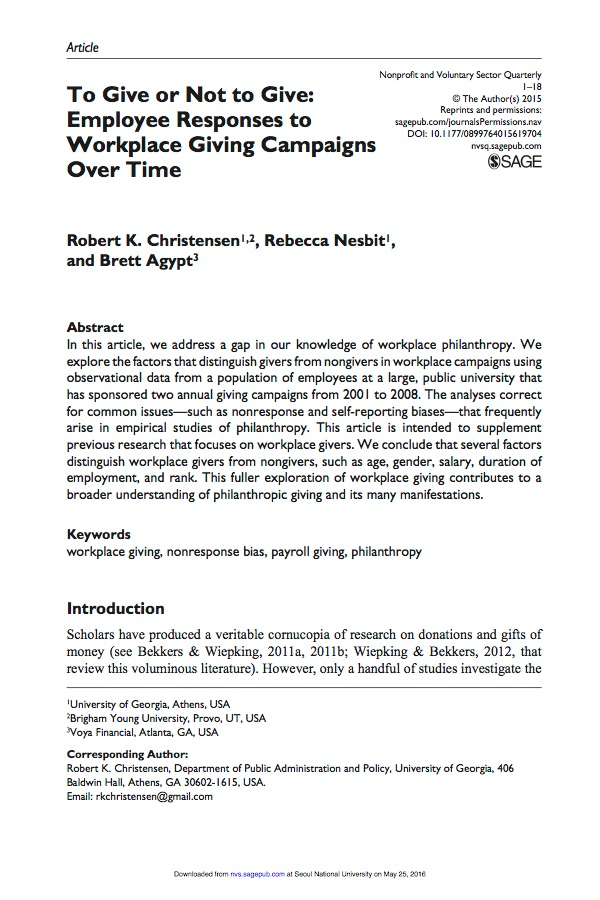 Robert K. Christensen, Rebecca Nesbit, and Brett Agypt. (2016) To Give or Not to Give: Employee Responses to Workplace Giving Campaigns Over Time. Nonprofit and Voluntary Sector Quarterly. 1-18
Robert K. Christensen, Rebecca Nesbit, and Brett Agypt. (2016) To Give or Not to Give: Employee Responses to Workplace Giving Campaigns Over Time. Nonprofit and Voluntary Sector Quarterly. 1-18In this article, we address a gap in our knowledge of workplace philanthropy. We explore the factors that distinguish givers from nongivers in workplace campaigns using observational data from a population of employees at a large, public university that has sponsored two annual giving campaigns from 2001 to 2008. The analyses correct for common issues—such as nonresponse and self-reporting biases—that frequently arise in empirical studies of philanthropy. This article is intended to supplement previous research that focuses on workplace givers. We conclude that several factors distinguish workplace givers from nongivers, such as age, gender, salary, duration of employment, and rank. This fuller exploration of workplace giving contributes to a broader understanding of philanthropic giving and its many manifestations.
2024-03-21
Read More -
 Tobin Im and Jisu Jeong. (2014) A Challenge for Making Public Administration a Social Science?: Time Study. Korean Society and Public Administration 24(4). 81-108
Tobin Im and Jisu Jeong. (2014) A Challenge for Making Public Administration a Social Science?: Time Study. Korean Society and Public Administration 24(4). 81-108What is the best way to theorize researches of public administration, a study of enhancing government competitiveness? Public administration researches should go along with solid theories from a science point of view. In Korea, lacking of theoretical foundation on public sector researches, public administration is in the identity crisis. This study shed light on the possibility of upgrading Korean public administration to a normal social science in terms of T. Kuhn’s framework. Specifically, this paper mainly focus on the contribution of time study. Firstly, it will discuss about how time study can be regarded as a social science and analyze trends of time study researches since 2002. Four categories of classification will be explored; policy and policy procedure, organization and bureaucracy, administration environment and institution, public administration and society. Then, this paper will try to find contributions and implications, also indicate the future directions of time study.
2024-03-21
Read More -
 Kilkon Ko and Sena Park. (2012) A Critical Review of Global Competitiveness Indices: Around the Global Competitiveness IMD and WEF In
Kilkon Ko and Sena Park. (2012) A Critical Review of Global Competitiveness Indices: Around the Global Competitiveness IMD and WEF InGlobal competitiveness indices are widely employed among researchers for they are interested in comparing the status, causes, and effect of national competitiveness. In some countries, including Korea, policy makers are also keen to their ranking on the global competitiveness indices and use them for policy-making. Despite the increased application of global competitiveness indices, however, their validity and correct utilization are still questionable. This study examines the global competitiveness indices of the International Institute for Management Development (IMD) and the World Economic Forum (WEF), focusing on their validity and utilization. The analysis suggests that subordinate indicators and evaluation items have changed over the years. The change, however, has not resulted in an improvement of the validity of the global competitiveness indices. Instead, their predictive validity and construct validity remain persistently low. Therefore, rather than using global competitive indices as an authoritative measure, special attention should be given them due to their inconsistent operationalization and questionable validity. Moreover, policy makers should be aware of the limitations of global competitiveness indices as they are merely a composite index produced by soft as well as hard data.
2024-03-21
Read More -
 Tobin Im, Wonhyuk Cho, Jisu Jeong, Min Ah Lee and Seyeong Cha. (2013) A Cross-County Comparison of Government Competitiveness: Measures and Evaluation. The Korean Association for Comparative Government 17(2). 95-124
Tobin Im, Wonhyuk Cho, Jisu Jeong, Min Ah Lee and Seyeong Cha. (2013) A Cross-County Comparison of Government Competitiveness: Measures and Evaluation. The Korean Association for Comparative Government 17(2). 95-124This study attempts to measure government competitiveness of OECD countries as an exploratory step for designing internationally comparable index, taking critical view on the existing indices that lack the consideration on the role of government played in managing overall competitiveness of a country. Based on the government competitiveness concept defined in our former study, we collected comprehensive dataset regarding major sectors of government activity, and produced government competitiveness index categorized also into different stages based on systems theory. We found that the overall government competitiveness of Korea is ranked 16th among 34 OECD countries in aggregated score: economic sector (9th), cultural sector (3rd), and ICT sector (10th) ranked higher than ranking of aggregated score while educational sector (20th), Health sector (27th), agricultural sector (28th), and environmental sector (25th) ranked lower than that. In terms of scores in stages of systems theory, government competitiveness of Korea ranked 20th in the throughput stage while ranked 4th in the outcome stage. Korea ranked 12th in the input stage and ranked 17th in the output stage.
2024-03-21
Read More -
 Wonhyuk Cho and Seyeong Cha. (2014) A Study of Internationally-Comparable Indices of ICT Development: Scope, Measures, and Limitations. Korea Journal of Public Administration 52(1). 177-218
Wonhyuk Cho and Seyeong Cha. (2014) A Study of Internationally-Comparable Indices of ICT Development: Scope, Measures, and Limitations. Korea Journal of Public Administration 52(1). 177-218This study aims at analyzing the characteristics of internationally-comparable indices that measure level of ICT development. The indices that were analyzed were the Digital Economy Rankings by the EIU, the Network Readiness Index by the WEF, the ICT Development Index by the ITU, and the E-Government Index by the UN. These indices were found to have different scopes, measures, weightings, and emphases, which result in different country rankings. Even though the ICT indices are useful in comparing performance of a country’s ICT development, the indices are also found to have limitations in several aspects: validity and reliability; consistency and distinctiveness of each index; lack of ICT governance measures; and availability of raw data. This study suggests the need for supplementing ICT development indices considering the limitations analyzed.
2024-03-21
Read More -
 Byunghak Kim, Kilkon Ko and Daejoong Kim. (2013) A Study on Foreigner Crime and Public Security Threat in Expatriates Enclave: The Characteristics of Chinese Crimes in Guro District. Korean Society and Public Administration 24(3). 343-372
Byunghak Kim, Kilkon Ko and Daejoong Kim. (2013) A Study on Foreigner Crime and Public Security Threat in Expatriates Enclave: The Characteristics of Chinese Crimes in Guro District. Korean Society and Public Administration 24(3). 343-372As South Korea gradually enters into the multicultural society, the crimes committed by expatriates are considered as a new threat of public security. Against this context, this study analyzes the characteristics and causes of Chinese immigrants" crimes focusing on Guro district in Seoul. We used the Korean Information System of Criminal Justice Services for the analysis of the status and characteristics of expatriates" crime. According to regression analysis of the data, there is no statistically significance in the violent crime rate between the Chinese expatriates and Koreans. However, Guro District densely populated with the Chinese shows the higher rate of murder and assault. Hence, the concentration, not the foreigner itself, can be one of causes of the violent crime. Moreover, our interview with the police and residents reveals that most violent crimes accidently happen under the weakened informal social control. Therefore, establishing the immediate response system to physical violence can help prevent more serious crimes.
2024-03-21
Read More -
 Tobin Im, Jisu Jeong and Yunho Kim. (2013) A Study on Influence Factors of Russian Civil Participation: Focusing on Government Satisfaction and Social Trust. Russian Studies 23(2). 277-304
Tobin Im, Jisu Jeong and Yunho Kim. (2013) A Study on Influence Factors of Russian Civil Participation: Focusing on Government Satisfaction and Social Trust. Russian Studies 23(2). 277-304This research examines government satisfaction and social trust as the main influencing factors on civil participation of Russian citizens. In addition to these variables, characteristics of media usage as well as engagement in public organizations are also considered as influence factors. Recently, Russian citizens have low level of trust and satisfaction toward their government, and government and democracy indicators in Russia found in many international indices are also very low. The main research question of this study is whether this current situation of distrust and dissatisfaction toward government may lead citizens to participate in society more actively. The analysis based on Russia in European Social Survey (ESS) showed that the higher the social trust is, the more active civil participations there are. On the contrary, high government satisfaction led to lower civil participation. Also, access and exposure to information through watching television, reading newspapers and using internet also turned out to be influential to the civil participation.
2024-03-21
Read More -
 Jongsung Lee, Youngduk Jang and Youngmi Choi. (2014) A Study on the Independent Development of International Relations Theories in South Korea, China, and Japan. Korean Journal of International 54 (4). 75-124
Jongsung Lee, Youngduk Jang and Youngmi Choi. (2014) A Study on the Independent Development of International Relations Theories in South Korea, China, and Japan. Korean Journal of International 54 (4). 75-124After World War II, the field of international relations produced a significant increase in studies in the three main countries in Northeast Asia South Korea, China, and Japan primarily relying on theories developed from the West. However, there have been a number of movements from these three countries to develop their own international relations theories. This study aims to trace the movements in each country and compare their collective theoretical achievements. We find that due to facing different international situations, South Korea, Japan, and China have developed their own theories in different ways. Japan was in the lead developing independent theories during the two world wars in the process of pursuing regional hegemony in East Asia. However, its effort to develop independent theories was severely weakened after the war defeat. Given the Chinese movement of liberation and reform since the 1980s, China has actively sought theoretical independence from the West. Its achievements are remarkable in terms of quantity, but it is still curious in terms of quality. Lastly, Korea has improved its ability to develop its own theories, with critical acceptance of theories from the West and has finally started to show remarkable achievements since 2000. We conclude that South Korea with cooperation from Japan and China could play a significant role in the development of independent Asian theories, which would serve to reduce theoretical gaps between the West and the East.
2024-03-21
Read More -
 Tobin Im and Byul Jeon. (2012) An Action System Approach to Public Organizations: The Formation of Informal Organizations. Korea Journal of Public Administration 50(2). 1-33
Tobin Im and Byul Jeon. (2012) An Action System Approach to Public Organizations: The Formation of Informal Organizations. Korea Journal of Public Administration 50(2). 1-33The purpose of this research is to analyze the action system of a public university cafeteria. Based on in-depth interviews and participant observations, this study reveals how a closed organization in Korean culture is naturally structured and adapts to time constraints and labor pressures brought to bear by the external environment. To be specific, this study tries to find out how informal groups are structured within the formal organizational structure and what the implications of a member`s behavior is in the Korean context, The results are as follow: 1) The organization operates under various environmental restrictions that shape potential behaviors, including the properties of members, the space frame of the cafeteria, and the time pressure to deliver a quick meal. 2) Three teams (a cooking group, a serving group, and a washing group) came into being spontaneously within the organization to enhance business operation efficiency under the above conditions. 3) These informal teams maintain a hierarchical structure, with one member at the head in order to manage conflict as well as to coordinate general business efficiently. It is concluded that it is necessary to consider the characteristics of autonomous organizational structures as well as how these structures are related to the organizational and societal culture when implementing reforms in order for government to strengthen its competitiveness.
2024-03-21
Read More -
 Tobin Im. (2014) Bureaucracy in Three Different Worlds: The Assumptions of Failed Public Sector Reforms in Korea. Public Organization Review 14(4). 577-596
Tobin Im. (2014) Bureaucracy in Three Different Worlds: The Assumptions of Failed Public Sector Reforms in Korea. Public Organization Review 14(4). 577-596Why is it so difficult to implement Western reform programs in Asian bureaucracies? To address this question, this study explores cultural aspects of national bureaucracies. A government bureaucracy is shaped by its cultural and historical context, and this paper specifically focuses on contrasting models of government bureaucracy in the USA, Korea, and Germany. Differences between the models are explained by examining both internal operations as well as the relative relationships of the state to society. Based on this, the incompatible assumptions of Korean reformers are examined. This study is useful for developing countries engaged in Western-style bureaucratic reform.
2024-03-21
Read More -
 Tobin Im. (2012) Central Government Civil Servants’ Policy Time Perspective: To Increase Government Competitiveness. Korean Public Administration Quarterly 24(3). 615-642
Tobin Im. (2012) Central Government Civil Servants’ Policy Time Perspective: To Increase Government Competitiveness. Korean Public Administration Quarterly 24(3). 615-642This study explores the key policies of central government departments from a time perspective based on the premise that government competitiveness increases when bureaucracy properly operates in ways regarding time. To test the hypothesis, we introduced two new concepts called “normative time span” and “real work time span” spent on performing departments’ key duties. We surveyed civil servants in 40 central government departments about both time spans (normative and real work). From their responses, we examined the discrepancy between two types of time span and the causes of this discrepancy. Furthermore, we analyzed how this discrepancy influences job satisfaction and turnover intention. As a result, we find that the discrepancy between two types of time span influences two factors. That is, there is a discrepancy between normative time span and real work time span, and this discrepancy is statistically significant when we consider factors suggested by this paper such as job characteristics, differences between support divisions and planning divisions, occupational groups, number of years worked, and age. Also, we find that as the discrepancy between two types of time span increases, turnover intention increases and job satisfaction decreases. Moreover, as real work time span increases, turnover intention decreases while job satisfaction increases. These results suggest that government competitiveness will be increased when government operates based on time perspective.
2024-03-21
Read More -
 Alfred Tak-Kei Ho and Tobin Im. (2015) Challenges in Building Effective and Competitive Government in Developing Countries: An Institutional Logics Perspective. The American Review of Public Administration.
Alfred Tak-Kei Ho and Tobin Im. (2015) Challenges in Building Effective and Competitive Government in Developing Countries: An Institutional Logics Perspective. The American Review of Public Administration.For the past two decades, many developing countries have begun to experiment with results-oriented reforms to make their governments more competitive. However, very few studies explore the question of the applicability and appropriateness of Western-oriented reforms in non-Western contexts. Based on theories of new institutionalism and institutional logics, this article examines some of the organizational, cultural, and political assumptions that are implicit in Western-styled reforms; how they may conflict with the institutional contexts of many developing countries; and how the conflicts may impact reform strategies and results. The article then recommends how future comparative research can focus more on inter-institutional layering problems. It also suggests a few hypotheses for future empirical works that are interested in exploring further the dynamics between institutional gap, implementation strategies, and leadership characteristics of results-oriented reforms.
2024-03-21
Read More -
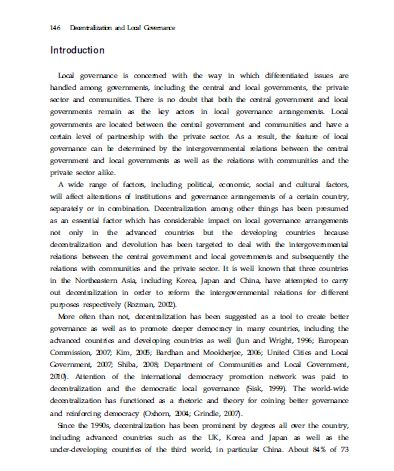 Soon Eun Kim. (2012) Decentralization and Local Governance: A Perspective of Local Governance Competitiveness of Japan. Journal of Korean Association for Local Government Studies 24(1). 145-170
Soon Eun Kim. (2012) Decentralization and Local Governance: A Perspective of Local Governance Competitiveness of Japan. Journal of Korean Association for Local Government Studies 24(1). 145-170The purpose of this study is to examine the effects of decentralization reform on local democracy and good local governance in Japan in terms of local governance competitiveness. Even though Japan has established a high level of mature economy, it has been heard that an authoritarian and hierarchical model of Japan has exerted a considerable power over the society and citizens by comparatively regulating the society (Shunichi, 2003). This study is supposed to investigate whether or not decentralization reform efforts in Japan have made a contribution to reinforce democracy and better governance characterized by a high level of citizen participation and with an increased level of partnership with the private sector by reducing a level of central control and supervision.
2024-03-21
Read More -
 Alfred Ho and Tobin Im. (2012) Defining a New Concept of Government Competitiveness. Korea Journal of Public Administration 50(3). 1-34
Alfred Ho and Tobin Im. (2012) Defining a New Concept of Government Competitiveness. Korea Journal of Public Administration 50(3). 1-34This paper criticizes various indexes of national competitiveness that are widely used these days and discusses the necessity of a new concept that represents the institutional capacity of a government of a country whose natural and historical conditions are different from others, National competitiveness indexes, such as IMD`s and WEF`s, for example, lack rigorous theoretical foundations and contain a lot of validity and reliability problems. Based on the arguments concerning the inherent defects of these concepts, this study proposes a new concept of Government Competitiveness. The new concept, incorporating systems theory, Maslow`s hierarchical needs theory, and Fukuyama`s state function theory as three basic foundational pillars, proposes the core components of a country`s competitiveness by integrating temporal and spatial dimensions. This study calls for further study to elaborate a more detailed model and more systematic indicators that will serve a country`s leaders for making strategic policies toward a more competitive government.
2024-03-21
Read More -
 Dong-Hwan Kim and Jesse W. Campbell. (2014) Development, Diversification, and Legitimacy: Emergence of the Committee-Based Administrative Model in South Korea Public Organization Review.
Dong-Hwan Kim and Jesse W. Campbell. (2014) Development, Diversification, and Legitimacy: Emergence of the Committee-Based Administrative Model in South Korea Public Organization Review.Recently, a committee-based policy making model has become an important element of South Korea’s administrative toolkit. However, most scholars and politicians recognize the inefficiency of this type of decision-making model. Why, then, does the committee-based model continue to gain traction? Taking an institutional perspective, this paper details the processes at work in the legitimation of administrative models in the Korean context, and proposes a framework for understanding how the committee-based system has become predominant. Korea’s rapid development over the past half-century has led to the diversification of groups from whom the government must seek legitimacy, and it is argued that the committee-based system continues to be adopted due to its ability to incorporate these diverse voices into the policy making process, while at the same time allowing the government to further its developmental agenda. The implications of this study for understanding the processes of administrative development are discussed.
2024-03-21
Read More -
 Soon Eun Kim. (2013) Discourses and Directions of Structural Reform of Metropolitan Governments in Korea: A Study of Urban Government Competitiveness. The Korean Journal of Local Government Studies 16(4). 55-77
Soon Eun Kim. (2013) Discourses and Directions of Structural Reform of Metropolitan Governments in Korea: A Study of Urban Government Competitiveness. The Korean Journal of Local Government Studies 16(4). 55-77Structural reform plans of metropolitan governments in Korea suggested until now have been diverse. There is also a myriad of legislation bills proposed by members of the National Assembly. With these diversities in mind, this study aims to find an appropriate model that suits current and future conditions. In order to do this, we analyzed various cases in USA, UK, and Japan. By analyzing these cases from overseas, we confirmed that many current metropolitan governments are seeking to reform their structural forms in order to enhance the competitiveness of cities. In particular, attempts at city-county consolidation in United States today, despite disputes and failures, deliver meaningful implications. Henceforth, future structural reforms of metropolitan governments in Korea should seek to strengthen urban government competitiveness.
2024-03-21
Read More -
 H.K. Kim and D.H. Shin. (2015) Domestic and Foreign Case Studies on ICT Convergence for Mental Health Improvement and Suicide Prevention. Journal of the Korea Contents Association 15(5).
H.K. Kim and D.H. Shin. (2015) Domestic and Foreign Case Studies on ICT Convergence for Mental Health Improvement and Suicide Prevention. Journal of the Korea Contents Association 15(5).Depression and mental illness across all age groups, and steady increasing in suicide rate are our major social problems which cause dramatically decreasing government competitiveness. While Korean government has implemented various policies to improve mental health and prevent suicide, it faces revealing issues in progress on implementation and referral management systems. The current research examined domestic and foreign cases to understand the actual status and directivity of ICT convergence plan in terms of mental health. The United States and the United Kingdom have provided convergent ICT service, tele-psychiatric care to senior citizens in rural areas, children and adolescents, socially disadvantaged class, etc. In Korea, emergency-notice devices are installed to prevent suicide for single elderly people, and diverse mobile health devices are developing to cure depression and Alzheimer's disease. ICT convergent mental health care service is needed to save socioeconomic costs and realize universal welfare for an aging society. Social consensus on sharply conflict issues, medical law and medical devices about tele-psychiatry service, effectiveness studies on users’ unique psychiatric characteristics by life cycle, and region-specialized strategies for the least densely populated rural regions with lower access to medical care should be considered.
2024-03-21
Read More -
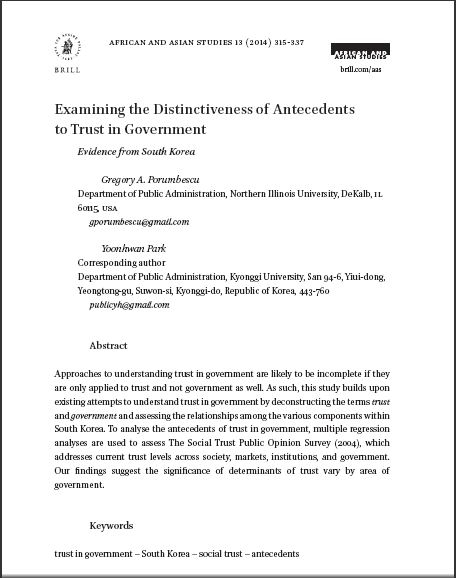 Gregory A. Porumbescu and Yoonhwan Park. (2014) Examining the distinctiveness of antecedents to trust in government: Evidence from South Korea. Journal of Asian and African Studies 13(3). 315-337
Gregory A. Porumbescu and Yoonhwan Park. (2014) Examining the distinctiveness of antecedents to trust in government: Evidence from South Korea. Journal of Asian and African Studies 13(3). 315-337Approaches to understanding trust in government are likely to be incomplete if they are only applied to trust and not government as well. As such, this study builds upon existing attempts to understand trust in government by deconstructing the terms trust and government and assessing the relationships among the various components within South Korea. To analyse the antecedents of trust in government, multiple regression analyses are used to assess The Social Trust Public Opinion Survey (2004), which addresses current trust levels across society, markets, institutions, and government. Our findings suggest the significance of determinants of trust vary by area of government.
2024-03-21
Read More -
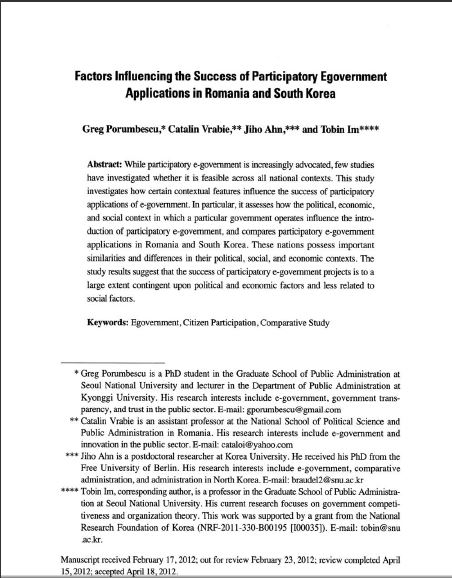 Greg Porumbescu, Catalin Vrabie, Jiho Ahn and Tobin Im. (2012) Factors Influencing the Success of Participatory E government Applications in Romania and South Korea. Korean Journal of Policy Studies 27(1). 1-21
Greg Porumbescu, Catalin Vrabie, Jiho Ahn and Tobin Im. (2012) Factors Influencing the Success of Participatory E government Applications in Romania and South Korea. Korean Journal of Policy Studies 27(1). 1-21While participatory e-government is increasingly advocated, few studies have investigated whether it is feasible across all national contexts. This study investigates how certain contextual features influence the success of participatory applications of e-government. In particular, it assesses how the political, economic, and social context in which a particular government operates influence the introduction of participatory e-government, and compares participatory e-government applications in Romania and South Korea. These nations possess important similarities and differences in their political, social, and economic contexts. The study results suggest that the success of participatory e-government projects is to a large extent contingent upon political and economic factors and less related to social factors.
2024-03-21
Read More

